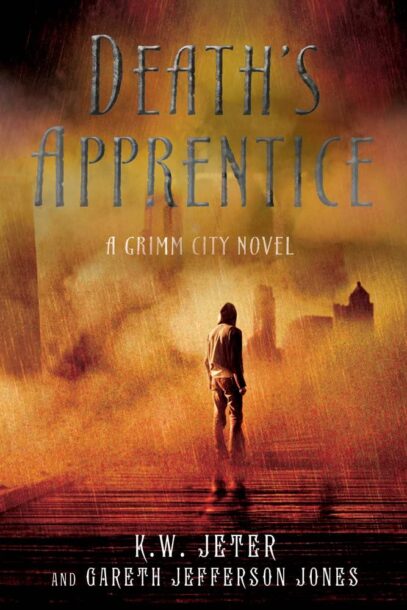 By K.W. JETER, GARETH JEFFERSON JONES (Thomas Dunne Books; 2012)
By K.W. JETER, GARETH JEFFERSON JONES (Thomas Dunne Books; 2012)
The recent explosion of Hell-set horror novels has produced some visionary masterworks (GOD’S DEMON) and, needless to say, quite a few efforts that are less-than-masterful. DEATH’S APPRENTICE, about a rebellion against the Devil taking place in a city situated atop the gates of Hell, falls somewhere in the middle. It’s certainly ambitious, and indisputably well written—as you’d expect given that co-author K.W. Jeter (of DR. ADDER, INFERNAL DEVICES and DARK SEEKER) is one of our finest modern genre scribes—but only puddle deep, existing on the level of a Hollywood action movie (or that old HEROES IN HELL fantasy series from the eighties).
The novel is also suffused by the spirit of the Brothers Grimm. It was inspired by no less than 13 of their stories and essays (all listed on the final page), making for yet another entry in the current revamped fairy tale craze. It’s apparently the first in a series of novels set in “Grimm City,” an environ shaped around Grimm related concepts.
The title character is seventeen-ear-old Nathaniel, who possesses supernatural powers that impress the angel of Death so much he takes Nathaniel on as an apprentice. Other pivotal characters include Hank, a (literally) fearless hit-man, as well as Blake, a former serviceman who got burned in a deal with the Devil and now has to contend with a coat he can’t ever remove, and Ling, a student who makes her own infernal deal in exchange for something that isn’t initially disclosed. When years later she learns that the price is her infant daughter, Ling contacts Hank to track down and bring the girl back. Nathaniel overhears Ling’s plea and becomes caught up in her cause, using Blake to help him out. All this results in a full-blown uprising against the Big D, with Nathaniel leading the charge.
As portrayed here the Devil comes off as a cross between Alan Rickman in DIE HARD and Professor Moriarty, i.e. as a scheming troublemaker who’s more a court jester than a true prince of darkness. Also, one would expect Nathaniel to utilize his amazing supernatural powers, which include the ability to stop time, less sparingly in the final uprising, which comes down to a lot of Hollywood friendly hand-to-hand fighting between the protagonists and the Devil’s minions (it’s quite easy to visualize the strife described here in terms of rain-drenched MATRIX-like slow motion Kung Fu). It’s all enjoyable enough, but I can’t help but feel that such ambitious subject matter deserves a more grandiose treatment.
